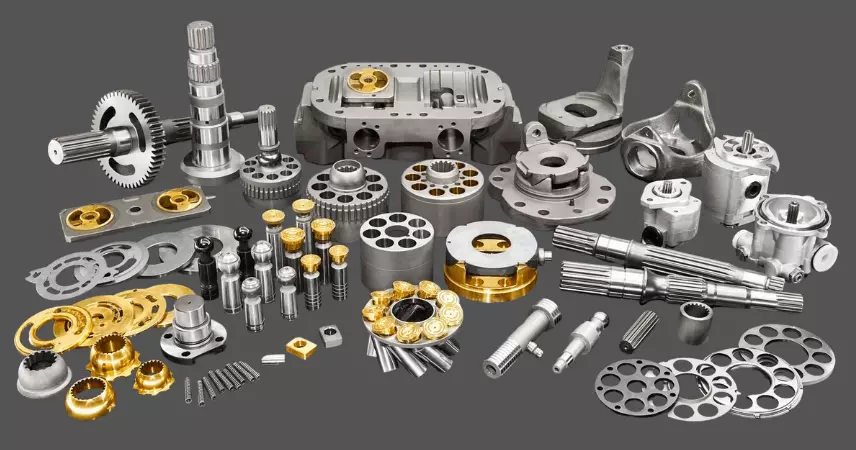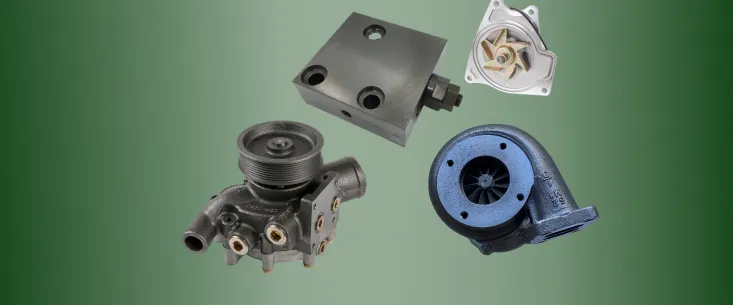+86-135 3388 0668
The Role of Parker Hydraulic pumps in Modern Industry

In the ever-evolving world of industrial technology, the demand for high-performance equipment is greater than ever. Among the many types of machinery that keep industries running, hydraulic pumps stand out as essential components for powering systems and machinery across a variety of sectors. Hydraulic pumps from Parker, a global leader in motion and control technologies, have earned a stellar reputation for their unmatched reliability, performance, and innovation.
Parker Hydraulic Pumps are specifically designed to deliver high pressure and efficiency while ensuring longevity and reliability under extreme working conditions. Whether it’s construction equipment, automotive systems, or industrial machinery, these pumps are engineered to meet the demanding needs of industries worldwide. But what exactly makes Parker Hydraulic Pumps a preferred choice for engineers, maintenance professionals, and business owners alike?
1. Understanding the Basics of Hydraulic Systems

Before diving into the specifics of Parker Hydraulic Pumps, it’s important to understand the fundamental role of hydraulic systems in industrial applications. A hydraulic system is a type of power transmission system that uses pressurized fluid to generate mechanical force. The system relies on a hydraulic pump to convert mechanical energy into hydraulic energy, which is then used to power machinery, vehicles, and tools.
In hydraulic systems, the pump serves as the heart of the operation. It generates the flow of fluid, which is essential for driving actuators, motors, and valves in the system. These pumps are powered by either electric or internal combustion engines and can operate at various pressure levels, depending on the specific requirements of the system.
Hydraulic pumps are classified based on their design, such as gear, piston, and vane pumps. Parker offers a wide range of hydraulic pumps designed for different applications, each with unique features and capabilities to maximize performance, efficiency, and energy savings.
2. The Engineering Excellence Behind Parker Hydraulic Pumps
Parker has long been a leader in the development of hydraulic systems and components, and their hydraulic pumps are no exception. The company’s engineering expertise and commitment to innovation have resulted in pumps that not only meet industry standards but often exceed them.
What sets Parker Hydraulic Pumps apart from competitors is their precision engineering. These pumps are designed to handle high-pressure environments and operate in harsh conditions. They are built with high-quality materials, such as forged steel and durable composites, ensuring longevity and minimal wear and tear. The advanced sealing technology used in Parker pumps prevents fluid leaks, which is crucial for maintaining system efficiency and safety.
Another distinguishing feature of Parker Hydraulic Pumps is their flexibility. Parker offers a range of pumps that are designed for specific industrial applications. From high-performance axial piston pumps used in heavy-duty machinery to compact Gear pumps used in smaller, mobile equipment, Parker provides solutions that cater to diverse needs.
3. Efficiency and Cost Savings with Parker Hydraulic Pumps
One of the most significant advantages of Parker Hydraulic Pumps is their energy efficiency. In industries where hydraulic systems are used extensively, minimizing energy consumption is crucial for cost control and environmental sustainability. Parker pumps are designed to optimize power output, reducing energy wastage and minimizing operational costs.
The energy-saving capabilities of Parker pumps are a result of their precision engineering, efficient flow control, and advanced motor integration. Many of Parker’s pumps feature variable displacement options, allowing for precise control over the amount of fluid being pumped. This not only maximizes energy efficiency but also ensures that the hydraulic system operates at peak performance, regardless of load or application.
In addition to energy efficiency, Parker Hydraulic Pumps are designed for ease of maintenance. With reduced wear and tear on components, businesses can expect lower maintenance costs and reduced downtime, both of which contribute to overall cost savings.
4. Versatility Across Industries
Parker Hydraulic Pumps are used in a wide variety of industries, demonstrating their versatility and adaptability to different applications. From construction and agriculture to automotive manufacturing and aerospace, these pumps are essential components in systems that require reliable power transmission.
In the construction industry, Parker pumps power heavy machinery, such as excavators, cranes, and loaders, enabling operators to perform tasks with high precision and efficiency. The rugged design of Parker pumps ensures they can withstand the tough conditions of construction sites, where equipment is often exposed to extreme temperatures, dirt, and vibrations.
In the agricultural sector, Parker pumps are used in tractors, harvesters, and irrigation systems. These pumps provide the necessary power to operate hydraulic lifts, steering systems, and other critical machinery. The durability and reliability of Parker Hydraulic Pumps ensure that agricultural equipment runs smoothly, even in challenging conditions.
The automotive and aerospace industries also rely on Parker pumps for a wide range of applications, from hydraulic steering systems to aircraft wing flaps. Parker’s commitment to quality and innovation ensures that their pumps meet the strictest industry standards for safety and performance.
5. Advanced Technologies for Greater Performance
Parker continues to innovate by integrating advanced technologies into their hydraulic pump designs. For instance, the introduction of smart hydraulic systems, which incorporate sensors and feedback loops, has revolutionized the way hydraulic systems are managed. Parker Hydraulic Pumps are often equipped with electronic controls that optimize pump performance in real-time, adjusting the flow and pressure to meet changing operational demands.
The use of digital technologies in hydraulic systems not only enhances performance but also provides valuable insights into system health. Parker’s pumps can be monitored remotely, allowing operators and maintenance teams to track performance metrics and identify potential issues before they result in costly failures. This predictive maintenance approach is a game-changer for industries that rely heavily on hydraulic systems.
Moreover, Parker is actively working on environmentally friendly solutions, such as energy-efficient pumps that reduce carbon footprints and pumps designed to work with bio-based oils and fluids. These innovations ensure that Parker Hydraulic Pumps are not only effective but also contribute to the sustainability goals of modern industries.
The Future of Parker Hydraulic Pumps: Innovation and Sustainability
As industries continue to evolve and face new challenges, the demand for high-performance, energy-efficient, and environmentally friendly hydraulic solutions grows. Parker Hydraulic Pumps, with their cutting-edge technologies and commitment to sustainability, are well-positioned to meet these challenges head-on.
6. Sustainability and Environmental Impact
In today’s world, sustainability is no longer just a buzzword—it’s a core consideration for businesses across all sectors. Parker is at the forefront of this movement, with a focus on creating hydraulic pumps that not only deliver superior performance but also minimize environmental impact. The company’s approach to sustainability is evident in their commitment to reducing energy consumption, extending the lifespan of products, and offering environmentally friendly solutions.
Parker’s engineers are continually developing pumps that operate with lower power consumption while maintaining high levels of efficiency. These energy-saving designs help businesses reduce their carbon footprints and lower their overall operating costs. Additionally, many of Parker’s hydraulic pumps are compatible with bio-based oils and fluids, offering a more environmentally friendly alternative to traditional petroleum-based lubricants.
By focusing on sustainability, Parker ensures that its hydraulic pumps meet the environmental and regulatory standards of industries worldwide. This commitment not only benefits the planet but also positions Parker as a leader in the green technology space.
7. The Impact of Industry 4.0 on Hydraulic Pumps
Industry 4.0, characterized by the integration of digital technologies such as the Internet of Things (IoT), artificial intelligence (AI), and automation, is revolutionizing manufacturing and industrial operations. Hydraulic pumps are no exception to this trend, and Parker is leveraging these advanced technologies to enhance the performance and efficiency of their pumps.
One of the key advancements brought about by Industry 4.0 is the integration of smart sensors into hydraulic systems. These sensors can provide real-time data on pump performance, such as pressure, flow rate, and temperature, which can be monitored remotely. This data allows operators to make adjustments on the fly, ensuring that the hydraulic system is always operating at peak efficiency.
Parker’s smart hydraulic pumps are equipped with these sensors, and their performance can be monitored using cloud-based platforms. This data-driven approach allows businesses to make informed decisions about maintenance, troubleshooting, and system optimization. Predictive maintenance, driven by AI algorithms, can even predict when a pump is likely to fail, enabling companies to address issues before they lead to costly downtime.
8. Custom Solutions for Unique Applications
While Parker offers a wide range of standard hydraulic pumps, they also understand that some applications require customized solutions. Parker’s engineering team works closely with clients to design and manufacture pumps that meet the specific needs of unique industries or applications. Whether it’s a high-pressure pump for deep-sea drilling or a compact pump for a mobile construction vehicle, Parker can deliver tailored solutions that provide the best possible performance.
This level of customization is what sets Parker apart from many of its competitors. Their ability to design and manufacture hydraulic pumps for niche applications ensures that businesses get the exact product they need to meet their operational requirements. This flexibility has made Parker a trusted partner for companies in diverse industries.
9. Parker's Global Reach and Support Network
With manufacturing facilities and distribution networks across the globe, Parker is able to serve customers in virtually every industry. Their global reach ensures that businesses, regardless of location, have access to high-quality hydraulic pumps and the support they need to keep their systems running smoothly.
Parker’s global network of distributors and service centers provides prompt and efficient support for customers. Whether it’s installation assistance, troubleshooting, or maintenance services, Parker’s expert technicians are available to ensure that their products deliver optimal performance throughout their lifespan.
10. Conclusion: The Future of Parker Hydraulic Pumps
As we look to the future, it’s clear that Parker Hydraulic Pumps will continue to play a pivotal role in powering the industries of tomorrow. With their focus on efficiency, innovation, and sustainability, Parker is setting the standard for hydraulic technology in the 21st century. As industries evolve and new challenges arise, Parker’s dedication to excellence and forward-thinking solutions ensures that they will remain at the forefront of the hydraulic pump market for years to come.
Whether it’s through cutting-edge engineering, sustainable practices, or industry-leading customer support, Parker Hydraulic Pumps are more than just pumps—they are the driving force behind some of the most advanced hydraulic systems in the world today.
Search
Blog & News